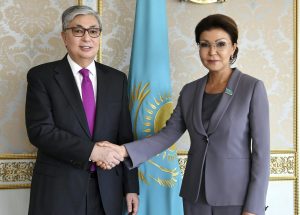In the spring of 2019, the Kazakh political scene experienced its greatest surprise to date with the resignation of President Nursultan Nazarbayev on March 19. In the immediate aftermath, the renaming of the country’s capital from Astana to Nur-Sultan and the elevation of Nazarbayev’s eldest daughter, Dariga Nazarbayeva, into the recently-vacated post of Senate chair appeared to cement the status and control of the Nazarbayevs even as the presidency shifted to Kassym-Jomart Tokayev, who had served as chair of the Senate from 2013 to 2019.
In Kazakhstan, the chair of the Senate — a post nominated by the president — is second-in-line for the presidency. Tokayev, after Nazarbayev’s resignation, served as acting president until he called for an early presidential election that took place amid protests in June 2019.
Nazarbayeva’s elevation to the chair of the Senate was eyed by many — myself included — as important, but precisely why was always a guessing game. In one view, it was a possible stepping stone to the presidency, a “heartbeat away” as the saying goes. In another, it was a gesture of respect for Tokayev’s predecessor, Nazarbayev, or a way to put to use in the administration a rumored rival.
It’s no surprise then that the news of Nazarbayeva’s dismissal on May 2, 2020, was followed quickly by talk of a potential power “struggle” between the Nazarbayevs and Tokayev. Nazarbayeva not only lost her top position but her Senate seat too. What does the dismissal actually mean?
When asked whether the dismissal was a sign of Tokayev asserting himself, Paul Stronski, a senior fellow at the Carnegie Endowment’s Russia and Eurasia Program, told The Diplomat that “the lack of transparency into the Kazakh political system makes this hard to determine.”
Stronski said the dismissal was certainly a “big bold move” on the part of Tokayev, but “I have a hard time believing that Tokayev did this without Nazarbayev’s consent or at least knowledge.”
So far, Nazarbayev has not commented on the shift.
To replace Nazarbayeva, Tokayev nominated Maulen Ashimbayev, who had previously served as first deputy chief of his presidential administration. On May 4, Ashimbayev was appointed to a seat in the Senate and the body then swiftly voted on his nomination to the chair position.
The timing of Nazarbayeva’s dismissal adds to the conspiratorial atmospherics. While she and her son came out on top of recent court proceedings in the UK, Stonksi commented that “it was messy and having that messiness revealed as the country goes through a tremendous economic and health crisis is bad for the system overall.”
In the midst of a global public health crisis combined with the bottom falling out of oil prices, Kazakhstan has not been spared. But as the crisis unfolded, Tokayev took center stage while Nazarbayev has stayed relatively in the background. This is in-part a tried-and-true autocratic tactic: No one likes to be the face of bad news if it can be avoided. As COVID-19 lays bare problems in Kazakhstan’s economic and healthcare systems, it’s a period of momentous risk, but also an opportunity unlike any other for Tokayev to prove himself.
“Tokayev’s technocratic response (and that of his government) to COVID certainly gives him greater clout suddenly, especially as Nazarbayev and his family faded into the background, likely not wanting to get tarnished by the havoc COVID has brought to the country,” Stronski told The Diplomat.
Appointing Ashimbayev, Stronski suggested, may signal that “Tokayev and/or ‘the system’ wants a capable technocrat in that spot, especially since there is urgent need to address the economic crisis that COVID has brought, on the heels of a public health crisis.”
Kazakhstan has always had a great many challenges ahead of it, all of them magnified by the pandemic. Amid the shifting of Ashimbayev from the presidential administration into the Senate, other shifts took place too: the Minister of Information and Social Development, Dauren Abaev, was slotted into Ashimbayev’s previous post; and Aida Balaeva, previously an assistant to the president, was named the new Minister of Information and Social Development.
Ultimately, what Nazarbayeva’s dismissal means will depend on where she lands next, how Nur-Sultan manages the current bevy of crises, and what other changes are in the offing. First President Nazarbayev retains significant position and power in the state, and none of that is changed by Dariga’s dismissal. As Stronski pointed out, “Nazarbayeva has been in and out of senior position for years — so getting shuffled about is par for the course for her.”
And murky politics is par for course for Kazakhstan. Shuffling of officials is nothing new to the political landscape of Kazakhstan or Central Asia, more broadly. At times such shuffles signify important shifts behind the scenes, and sometimes they don’t. Absent inside information clarifying the reasoning for Nazarbayeva’s dismissal, what we’re left with are educated guesses and speculation.

































